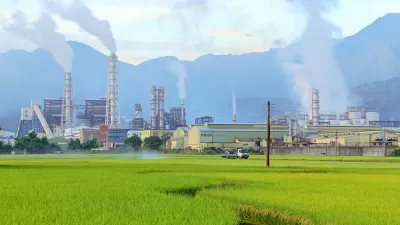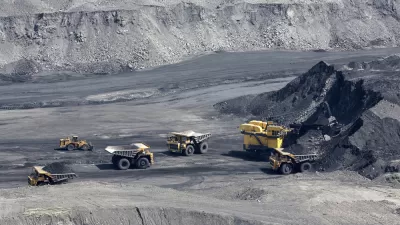NPR host Linda Wertheimer interviews Evan Osnos about his current New Yorker piece on the Jan. chemical spill into W. Va.'s Elk River. His focus is less on the spill and more on the influence of Big Coal in government and how it contributed to it.
Wertheimer asks Evan Osnos, "You describe a state where the regulations covering the coal industry, related water quality centers, all of that, have been weakened. How did it happen?"
[Note: the chemical that spilled, MCHM—4-methylcyclohexane methanol, is used to wash coal.]
For those who thought, "Must have been the work of a Republican governor" like we recently saw in North Carolina, think again. Pollution and lax environmental regulations are nonpartisan.
Osnos, an investigative journalist who won the Pulitzer prize in 2008, answers. "Over the course of the last few years, the elected leaders of West Virginia have said that they will resist what they called the Obama administration's war on coal [disputed by EPA Administrator Gina McCarthy]. As an example, senior members of the Environmental Protection Department have told me that the governor, Joe Manchin, from 2005 to 2010..." Wertheimer interupts. "A Democrat." Osnos continues.
A Democrat who believes very strongly in the importance of coal. He told the environmental inspectors very clearly that he didn't want them to be focused most on enforcement. He wanted them focused most on what he called compliance assistance, which was not issuing fines and violations but is, in fact, encouraging companies to do better. As a result, the federal government came in and said that West Virginia's environmental enforcement had become so lax, that they were no longer able to prevent even what was described as willful intentional violations from happening.
Once again, sounds a lot like North Carolina under the current governor, Pat McCrory, as we wrote in "Regulators Told Not To Do Their Job."
Manchin was succeeded by Earl Ray Tomblin, also a Democrat. From The New Yorker:
The state has become a standard-bearer for pro-business, limited-government conservatism. The day before the chemical spill, the governor, Earl Ray Tomblin, delivered his State of the State address, criticizing federal environmental regulators and vowing, “I will never back down from the E.P.A., because of its misguided policies on coal.”
One of the most insightful parts of his article is explained in response to Wertheimer's question: "Despite the power of big coal, this piece does seem to have a sort of subtext which suggests that this might be coal's last stand."
What's really interesting about what happened in West Virginia is that you have an industry that is shrinking economically in America. But as it shrinks, it has organized itself politically and it's become a more potent force in state government and ultimately also in federal government. You know, what the coal industry has done is transformed the conversation about energy into a cultural issue.
Osnos goes on to reveal that the coal industry is responsible for only three percent of the state's labor force, but you'd never know it; a testament to the success of Big Coal in "altering people's perceptions" about the importance of the industry to the state.
Listen to the NPR report or read the transcript.
FULL STORY: Chemical Spill In W. Va. Tests Tolerance For Big Coal

Alabama: Trump Terminates Settlements for Black Communities Harmed By Raw Sewage
Trump deemed the landmark civil rights agreement “illegal DEI and environmental justice policy.”

Study: Maui’s Plan to Convert Vacation Rentals to Long-Term Housing Could Cause Nearly $1 Billion Economic Loss
The plan would reduce visitor accommodation by 25% resulting in 1,900 jobs lost.

Why Should We Subsidize Public Transportation?
Many public transit agencies face financial stress due to rising costs, declining fare revenue, and declining subsidies. Transit advocates must provide a strong business case for increasing public transit funding.

Wind Energy on the Rise Despite Federal Policy Reversal
The Trump administration is revoking federal support for renewable energy, but demand for new projects continues unabated.

Passengers Flock to Caltrain After Electrification
The new electric trains are running faster and more reliably, leading to strong ridership growth on the Bay Area rail system.

Texas Churches Rally Behind ‘Yes in God’s Back Yard’ Legislation
Religious leaders want the state to reduce zoning regulations to streamline leasing church-owned land to housing developers.
Urban Design for Planners 1: Software Tools
This six-course series explores essential urban design concepts using open source software and equips planners with the tools they need to participate fully in the urban design process.
Planning for Universal Design
Learn the tools for implementing Universal Design in planning regulations.
Caltrans
Smith Gee Studio
Institute for Housing and Urban Development Studies (IHS)
City of Grandview
Harvard GSD Executive Education
Toledo-Lucas County Plan Commissions
Salt Lake City
NYU Wagner Graduate School of Public Service




























